Palo Alto
- eatwithoutworrytag
- Jul 20, 2023
- 9 min read
Updated: Dec 31, 2025
Wildseed
by: Jacqueline See-Tho
Source (bottom two rows of photos): Yelp
Address (at Town and Country): 855 El Camino Real, Palo Alto, CA 94301
Phone Number: (408) 781-0112
Email Address: PaloAlto@wildseedsf.com
Website: wildseedsf.com
Instagram: @wildseedsf
Facebook: @wildseedsf
Hours:
Monday - Thursday: 11:30AM - 9PM Friday: 11:30AM - 10PM Saturday: 11AM - 10PM Sunday: 11AM - 9PM
Happy Hour:
Monday - Friday: 4PM - 6PM
I met with Daniel Clark, the manager of the Wildseed branch in Palo Alto, on a bright Friday afternoon. Wildseed is an entirely vegan restaurant. Its mission is to serve those with a variety of diets and dietary restrictions, while also helping the planet by eating more sustainably and plant-based. Their website states “We believe that eating well should be easy to do, good for you, and delicious.”
Wildseed is a very allergy-conscious restaurant. Clark presented me with detailed allergy menus. They currently have menus specifically for those with wheat, nut, and soy allergies, which are the most common food allergies that they come across.
They also have a general cheat sheet that lists the allergens in each dish. Clark showed me the allergy information binder that they keep on hand. The binder includes the specific menus, the cheat sheet, an ingredients list, and allergy information for each ingredient not made in house such as vegan cheese. These ingredients will sometimes have things like pea protein or potato starch, which can be an issue for some patrons. This binder is updated every four months when the menu is changed. (You can check out their current menu here.)
Servers are taught and quizzed on the basic allergens as well as how to check allergens with the cheat sheet. Staff are trained to always ask about allergies/dietary restrictions and severity when taking orders so that they can recommend the safest dishes. Clark gave me some examples of follow-up questions that servers might ask: “‘Is this something where I have to worry about cross-contamination? Are there any specific nuts? If it’s a peanut allergy does it include other legumes?’...[It’s] up to the server to know this cross-contamination because they have the resources to find it and be able to assess how much of an issue it is going to be and what dishes are going to be the safest.” For example, servers might suggest that customers steer away from items that are harder to avoid cross contamination with, like pasta. Even though Wildseed offers gluten-free pasta, all of the pasta is cooked in the same water.
Servers will mark specific allergies on a special tab on their handheld devices and talk to the expeditor. The expeditor, who communicates with the kitchen, will take charge of directing the kitchen on how to handle dishes for those with food allergies to ensure a safe meal. These precautions can include a change of gloves, a separate prep area, and ingredient substitutions. Clark told me that “often times servers will get a manager involved, especially for some of the more difficult or more hidden allergies or the ones where it’s a combination.”
The next step in their protocol is in the kitchen. The chefs can usually mix and match items to accommodate to food allergies. Clark explained that the risotto and strawberry rhubarb crumble uses gluten-free flour because it “doesn’t change the taste and allows more guests to enjoy the food.” The gluten-free flatbreads are cooked in a separate oven with a dedicated pan to keep it off of shared surfaces. “Chef Michael, he’s the one who’s usually coming up with something and he’ll try it and he’ll see ‘Hey if I can take this allergen out and not change it, awesome!’” In the restaurant it is most difficult to avoid alliums because onions and garlic are in most of the dishes. However, there are still a few options.
Clark has a very cautious and thoughtful approach because of his experience with a father who is severely wheat intolerant. “There are some people at that [extreme] sensitivity level where I have to watch out with things like — Okay, the burner which we’re making curry on is here, but our stand mixer is here. Are they on at the same time? So that’s the level at which I’m trying to think at.” Like most restaurant settings, catering to the most extreme allergies can be very hard. However, Clark seemed confident that Wildseed would be able to provide safe and delicious meals for the majority of the food allergy community that comes through its doors.
Allergy Menu:



"Cheat Sheet" (list of allergens in dishes)

Interview with Chef:
What's your process when you have customers with food allergies and how do you accommodate that, and what does the protocol look like?
We are trying to have all of our servers check with their opening spiel. Like, "Hello, welcome in. How are you doing today?" Ask before they leave the table, first time, "Hey, are there any allergies or dietary restrictions we need to work with today?" Most of the servers are pretty good at that. We're still working on some of them. Once that happens, it's follow up questions like, "This is something where I have to worry about cross-contamination. Are there any specific nuts?" If it's a peanut allergy, "Does it include other legumes?", etc.
Main one we get, of course, is going to be gluten and it's just a question of, "Hey, cross-contamination. What's your tolerance level on it?" because I'm not going to suggest some items with the higher cross contamination if that's the case. After that happens, then the server, on their little handheld, can put in an allergy on our allergy tab, or they can write one in if it's a little more obscure. They go ahead and talk to our expeditor, who's usually standing up here. An expeditor communicates it to the kitchen. So, it's both on the tickets for the kitchen to see and expo knows what's happening there. Depending on the severity, sometimes we'll do the standard change gloves or just move to a different prep area.
At that point, it's usually in the expo's hands to communicate with the kitchen and make sure that it's going to be a safe dish or meal for the guest with whatever substitutions I need. Oftentimes, servers will get a manager involved, especially for some of the more difficult or more hidden allergies, or the ones where it's a combination. We had this one lady who couldn't do corn, soy, or walnuts and almonds, and I think possibly even one more. That was a, "Hey, come over to me. Let me make something. Let me let you know what is safe here," and kind of go from there.
Specifically in the kitchen, is there protocol when it comes to separate pans or things like that?
For the dishes which are done in a pan, there aren't much in the way of the allergen we can take out of something, but I think those pans are pretty much kept as gluten-free and nut-free just not even intentionally. Items like the risotto, traditionally done with flour, we're using a gluten-free flour because it doesn't change the taste and allows more guests to enjoy the food. Same with the curry, the spicy, yellow curry, that's also one of the ones which touch the pan. For the flatbreads that we put into the oven, we tend to put the gluten-free flatbreads into a separate oven as much as possible with a dedicated little pan to keep it off of the same surface as other flour.
Although that of course is a potential risk for cross-contamination, it's a little lower. There's so much we can't do that as much for, like we only have one thing for pasta water. If someone is sensitive on cross-contamination, we steer you away from the pasta, even if we do have a gluten-free option, we're using a Banza, so chickpea base there. Mostly that and it's a little bit up to the server to know where there's cross contamination because they have the resources to find it and be able to assess how much of an issue is it going to be and what dishes are going to be the safest.
Are there any dishes that are top nine allergen free?
I don't believe so, but with most things we can mix and match a little bit. Let's say someone has a nut allergy. Our risotto right now has a little dollop of almond ricotta on top, but that's the only place for it. We don't have to add that on. If it's gluten allergy, that one's already good to go. It's going to have alliums and I don't believe it has any soy, but you just have to mix and match a little bit. The more difficult ones here are alliums cause there's onions and garlic in most folks here. We had a gentleman here yesterday with a serious allium allergy and I have these three or four options, but I still at least have three or four options.
How does Wildseed serve people with different diets and dietary restrictions?
With Wildseed being a vegan restaurant with a lot of international styles, it's trying to be open to anyone and approachable, and part of that is of course allergies. With vegan foods, there's so many ingredients within the ingredients. It can get messy at times. Nightshades potato is in a lot of vegan cheeses, for example. It's really about trying to keep a lot of flavor, but where we can make substitutions to make something safer, we will. If something can be done with gluten-free flour and taste the same, we're going to do it that way. We don't use straight soy sauce here; we're using Tamari the whole way through because it doesn't change the flavor of anything here and it basically costs the same and it's all upside. It's consciously trying to be cognizant of allergens, but not always going out of our way to avoid, per se, but by knowing, it gives us the power to give our guests a good meal.
Anything else about your process?
There's not a huge amount in the process. Most of it goes through one of our chefs. Usually Chef Michael, Chef Alejandro sometimes steps in, but he's got 10 other restaurants to deal with, too. Chef Michael is the one who's usually coming up with something, and he'll try it and then he'll just see it's like, "Hey, if I can take this allergy out and not change it, awesome." But if he can't, he's not going to really go out of his way too much.
Funnily enough, we have a strawberry rhubarb crumble on the menu right now. We tried it with regular flour and gluten-free flour, and it tastes better with the gluten-free, so we went with that, so things like that.
We try and care. For me personally, my dad is severely wheat intolerant from having an overactive immune system and doing a lot of baking, inhaling flour. It's anaphylactic shock level, contact allergy to flour and other wheat products. For someone of that sensitivity level, eating out is even more difficult.
There's some people at that sensitivity level where I have to watch out and think it's, "Okay, the burner, which we're baking curry on is here, but our stand mixer is here. Are they on at the same time?" That's the level which I'm having to try and think at for it because I want to be able to bring my dad food from here, but at that extreme level of allergen, I'm not always 100% percent confident on it, but like celiac level where there is still zero tolerance, but aerial cross-contamination from 15, 20 minutes prior isn't going to be an issue.
That's approximately the level which we're striving for. Someone celiac or someone definitely allergic to someone can be here safely as long as it's not the absolute most extreme, where chances are they're not eating out much in the first place.
When sourcing ingredients, do you find it hard to find things that do not have cross-contamination?
It's not too difficult here largely because we're making a lot of our things in house because it's mostly going to be various veggies and then some of the bases like the cheeses that come in. We haven't had issues with cross contamination on those as far as I know, but we do always have to look out for, "Hey, what is in this?" Say someone who's allergic to peanuts and more legumes, pea protein is in a lot of the fake meats. That's one of the weird ones which you're not going to think about most of the time. It's mostly just knowing what's in the items which we're purchasing. That comes down more towards me and the other manager here, Nicolette.
When training staff members, what does that look like?
It's mostly making sure they know of the basic allergens and then quizzing them a little bit. That's a large portion of why I have this cheat sheet here. I'll change these up. We don't always get absolutely 100% everything on here, but we try and get it as accurate as possible, so the staff know to double check as well. This is being updated basically every time we see an error or every time the menu changes, which would be every couple months.
Whenever someone messages us with allergy questions, I have a tendency to send them back a, "Hey, this is what I think is going to be safe for you." Or if it's one of the common ones, I can send them a full menu at this point.
Have you been to Wildseed? Planning to go? Feel free to leave your own thoughts in the comment section and/or ask questions about this restaurant, and we will try our best to answer!




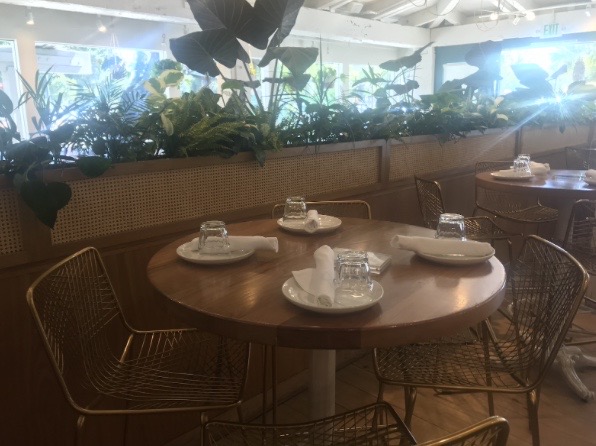

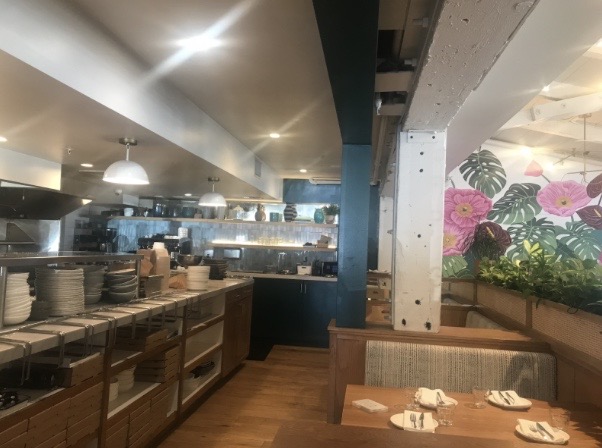

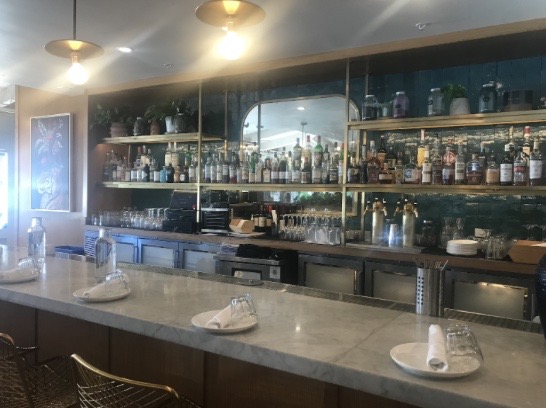

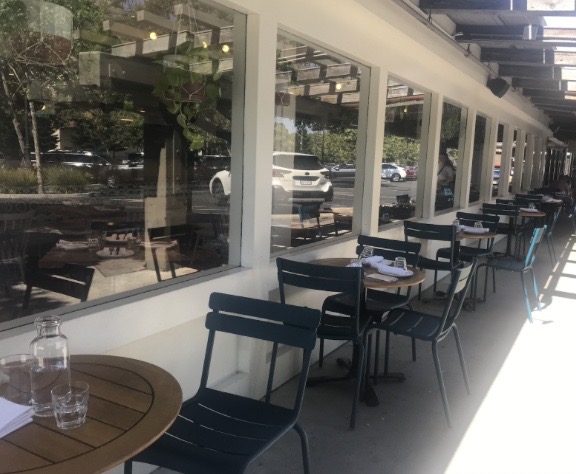

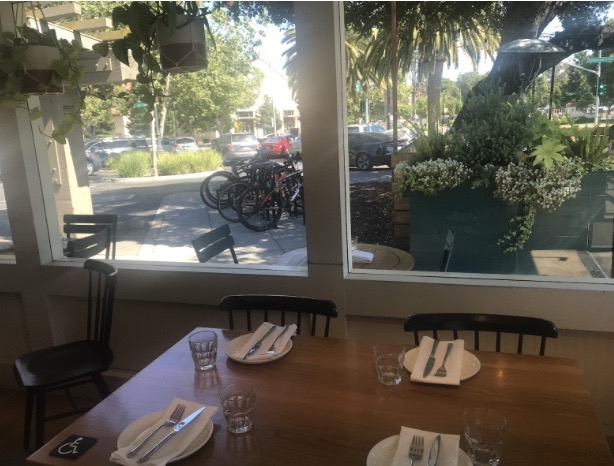

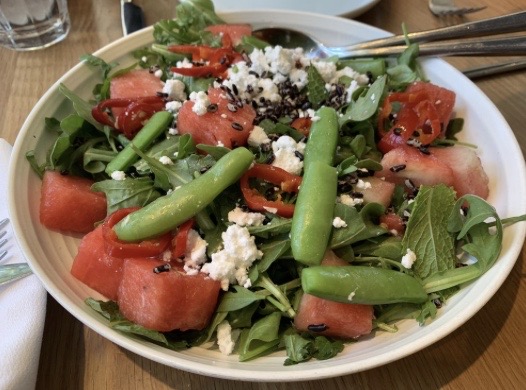



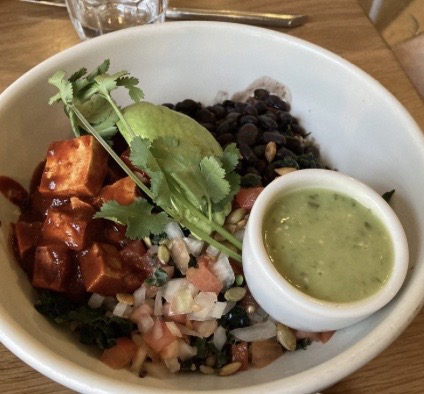









Thank you so much for finding this restaurant and writing about it! I've never eaten the food from restaurants before because of my food allergies but I'm going to try this restaurant this weekend!
So Thank you so much!!!😃